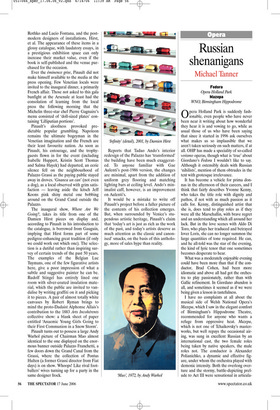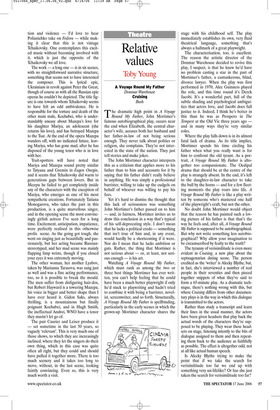Russian shenanigans
Michael Tanner
Fedora Opera Holland Park Mazepa WNO, Birmingham Hippodrome
Opera Holland Park is suddenly fashionable, even people who have never been near it writing about how wonderful they hear it is and vowing to go, while as usual those of us who have been saying that since it started in 1996 ask ourselves what makes us so implausible that we aren’t taken seriously on such matters, if at all. OHP has made a speciality of so-called verismo operas, though what is ‘true’ about Giordano’s Fedora I wouldn’t like to say. Although it ostensibly deals with Russian ‘nihilists’, mention of them obtrudes in the text with grotesque irrelevance.
It has become a vehicle for prima donnas in the afternoon of their careers, and I think that fairly describes Yvonne Kenny, who takes the title role with dignity and pathos, if not with as much passion as it calls for. Kenny, distinguished artist that she is, does tend to play roles as if they were all the Marschallin, with brave regret and an understanding which all around her lack. But in the love scenes with Aldo Di Toro, who plays her traduced and betrayed lover Loris, she can no longer summon the large quantities of tone required. He can, and he all-told was the star of the evening, the kind of lyric tenor that one sometimes becomes desperate to hear.
What was a moderately enjoyable evening could have been more than that if the conductor, Brad Cohen, had been more idiomatic and above all had got the orchestra to play passionately, rather than with Gallic refinement. In Giordano abandon is all, and sometimes it seemed as if we were being given a lesson in tastefulness.
I have no complaints at all about the musical side of Welsh National Opera’s Mazepa, which I saw in the elegant comfort of Birmingham’s Hippodrome Theatre, recommended for anyone who wants a refuge from oppressive heat. Mazepa, which is not one of Tchaikovsky’s masterworks, but well repays the occasional airing, was sung in excellent Russian by an international cast, the two female roles being taken by native speakers, the male roles not. The conductor is Alexander Polianichko, a dynamic and effective figure, under whom the orchestra played with demonic intensity. Both the overlong overture and the stormy, battle-depicting prelude to Act III were sensational in articula tion and violence — I’d love to hear Polianichko take on Fedora — while making it clear that this is not vintage Tchaikovsky. One contemplates this excited music without becoming involved with it, which is just the opposite of the Tchaikovsky we all love.
The work — a long one — is in six scenes, with no straightforward narrative structure, something that seems not to have interested the composer. This is lyrical epic, Ukrainians in revolt against Peter the Great, though of course as with all the Russian epic operas he couldn’t be depicted. The title figure is one towards whom Tchaikovsky seems to have felt an odd ambivalence. He is responsible for the torture and death of the other main male, Kochubei, who is understandably uneasy about Mazepa’s love for his daughter Mariya, an adolescent (she returns his love), and has betrayed Mazepa to the Tsar. At the end of the opera Mazepa wanders off, with no indicated future, leaving Mariya, who has gone mad, after he has disposed of the young tenor who is in love with her.
Trait-spotters will have noted that Mariya and Mazepa sound pretty similar to Tatyana and Gremin in Eugen Onegin, and it seems that Tchaikovsky did warm to generations gaps between lovers. But in Mazepa he failed to get completely inside any of the characters with the exception of Mariya, who emerges as one of his most sympathetic creations. Fortunately Tatiana Monogarova, who takes the part in this production, is a quite marvellous singer, and in the opening scene the most convincingly girlish actress I’ve seen for a long time. Excitement, anticipation, impatience, were perfectly realised in this otherwise prolix scene. As the going got tough, she went on singing just as beautifully and passionately, but her acting became Russianstereotyped, and her mad scene was mainly flapping limp wrists, though if you closed your eyes it was extremely moving.
The other woman, her mother Lyubov, taken by Marianna Tarasova, was sung just as well and was a fine acting performance, too, so it is possible to break the mould. The men suffer from disfiguring hair-dos, but Robert Hayward is a towering Mazepa, his voice in bigger and better shape than I have ever heard it. Gidon Saks, always thrilling, is a mountainous but finally poignant Kochubei, and in Hugh Smith, the ineffectual Andrei, WNO have a tenor they mustn’t let go of.
The pair Caurier and Leiser produce it — set sometime in the last 50 years, so vaguely ‘relevant’. This is very much one of those shows, to which they are increasingly inclined, where they let the singers do their own thing, which in this case was quite often all right, but they could and should have pulled it together more. There is too much scenery and it takes too long to move, without, in the last scene, looking faintly convincing. Even so, this is very much worth a visit.



















































































 Previous page
Previous page